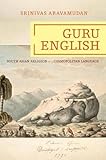Guru English : South Asian Religion in a Cosmopolitan Language.
Material type: TextSeries: Translation/Transnation SerPublisher: Princeton : Princeton University Press, 2005Copyright date: ©2006Description: 1 online resource (275 pages)Content type: text Media type: computer Carrier type: online resourceISBN: 9781400826858Subject(s): Cosmopolitanism -- India | English language -- Religious aspects -- South Asia | English language -- Social aspects -- South Asia | Religion and culture | South Asia -- Religion -- Study and teachingGenre/Form: Electronic books.Additional physical formats: Print version:: Guru English : South Asian Religion in a Cosmopolitan LanguageDDC classification: 420/.954 LOC classification: PE3502.G87 -- A73 2006ebOnline resources: Click to View
TextSeries: Translation/Transnation SerPublisher: Princeton : Princeton University Press, 2005Copyright date: ©2006Description: 1 online resource (275 pages)Content type: text Media type: computer Carrier type: online resourceISBN: 9781400826858Subject(s): Cosmopolitanism -- India | English language -- Religious aspects -- South Asia | English language -- Social aspects -- South Asia | Religion and culture | South Asia -- Religion -- Study and teachingGenre/Form: Electronic books.Additional physical formats: Print version:: Guru English : South Asian Religion in a Cosmopolitan LanguageDDC classification: 420/.954 LOC classification: PE3502.G87 -- A73 2006ebOnline resources: Click to View Cover -- Half title -- Title -- Copyright -- Dedication -- Contents -- Acknowledgments -- Introduction -- Chapter One Theolinguistics: Orientalists, Brahmos, Vedantins, and Yogis -- Chapter Two From Indian Romanticism to Guru Literature -- Chapter Three Theosophistries -- Chapter Four The Hindu Sublime, or Nuclearism Rendered Cultural -- Chapter Five Blasphemy, Satire, and Secularism -- Chapter Six New Age Enchantments -- Afterword -- Notes -- Index.
Guru English is a bold reconceptualization of the scope and meaning of cosmopolitanism, examining the language of South Asian religiosity as it has flourished both inside and outside of its original context for the past two hundred years. The book surveys a specific set of religious vocabularies from South Asia that, Aravamudan argues, launches a different kind of cosmopolitanism into global use. Using "Guru English" as a tagline for the globalizing idiom that has grown up around these religions, Aravamudan traces the diffusion and transformation of South Asian religious discourses as they shuttled between East and West through English-language use. The book demonstrates that cosmopolitanism is not just a secular Western "discourse that results from a disenchantment with religion, but something that can also be refashioned from South Asian religion when these materials are put into dialogue with contemporary social move-ments and literary texts. Aravamudan looks at "religious forms of neoclassicism, nationalism, Romanticism, postmodernism, and nuclear millenarianism, bringing together figures such as Swami Vivekananda, Sri Aurobindo, Mahatma Gandhi, and Deepak Chopra with Rudyard Kipling, James Joyce, Robert Oppenheimer, and Salman Rushdie. Guru English analyzes writers and gurus, literary texts and religious movements, and the political uses of religion alongside the literary expressions of religious teachers, showing the cosmopolitan interconnections between the Indian subcontinent, the British Empire, and the American New Age.
Description based on publisher supplied metadata and other sources.
Electronic reproduction. Ann Arbor, Michigan : ProQuest Ebook Central, 2018. Available via World Wide Web. Access may be limited to ProQuest Ebook Central affiliated libraries.

There are no comments on this title.